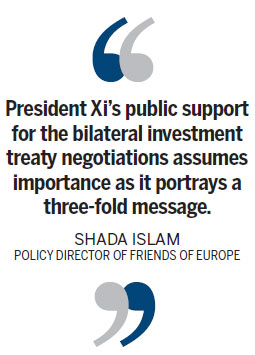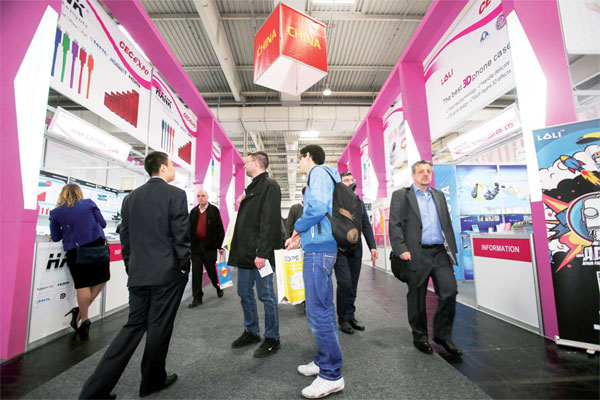Pact making good progress

| About 700 Chinese exhibitors attended the 2014 Hanover Communications and Information Technology Exposition, Germany's largest IT exhibition, held from March 10 to 14. Zhang Fan / Xinhua |
Sino-EU investment agreement will help push a better trade agenda, experts say
Bilateral investment treaty talks between China and the European Union are expected to get fresh impetus this year with officials from both sides agreeing on the need for more discussions to work out the various modalities.
China showed how seriously it views the issue when President Xi Jinping, during his trip to Europe, urged EU officials to fast-track the talks. The president's views come at a time when several European policymakers have also made similar observations.
Xi, however, was more emphatic when he indicated that European nations like the Netherlands should play a bigger role in the negotiations. The second round of bilateral investment treaty negotiations between China and the EU are expected to start in Brussels soon after Xi's visit.
"The Netherlands is our second-biggest trade partner within the EU and a country that has championed free trade and economic globalization," Xi said in his address to the Sino-Dutch economic and trade forum in Noordwijk, the Netherlands, on March 23. "We hope that the Netherlands can play its due role in the negotiations."
Xi is expected to make similar appeals during his meetings with top EU officials and leaders from France, Germany and Belgium. Beijing has also reiterated that it is keen on speeding up the negotiations with Brussels so that it can move ahead with joint feasibility studies.
Political observers feel that the better-than-expected outcome from the first meeting between the two sides has already given enough signs of a positive outcome soon.
"Both sides have indicated that they do not need any extra warming-up and are ready to start the agreement text talks directly," say top-level sources familiar with the negotiations.

The sources also said that the Sino-EU talks could make quicker progress than those between China and the US. In the latter case, both sides engaged in nine rounds of preparatory talks before starting the agreement text negotiations recently.
Though the Chinese side is confident that the treaty bottlenecks can be sorted out amicably, European observers feel that the process could get bogged down in the European Parliament due to political considerations.
"President Xi's public support for the bilateral investment treaty negotiations assumes importance as it portrays a three-fold message," says Shada Islam, policy director of Friends of Europe, a Brussels-based think tank.
Islam says the first message is a clear signal that China's top leaders are committed to the EU, an important force in the evolving world.
The second message indicates that Beijing is committed to improving economic and trade relations with the EU, though Brussels has not yet granted Beijing market economy status.
The treaty will help increase China's investments in Europe and keep the Chinese market open for European investors, which, Islam says, is the third part of the message.
Islam says that though the EU and China have just started treaty negotiations, it is clear that Europe is looking for an ambitious investment agreement. "It is not just about protection of investments but also market access and anti-discrimination issues." Islam says that the negotiations would be a slow process, as both sides will look to protect their own interests.
"This is normal in all economic agreements," she says, adding that the free trade talks between the EU and India are now in their eighth year.
For the EU, it is more of a step-by-step process, wherein the priority would be to draft a good investment agreement, to make sure it works and then see whether the same is agreeable to China. "The whole process is going to take some time," Islam says.
Dennis Pamlin, founder of 21st Century Frontiers, a Sweden-based consultancy, says Xi has clearly indicated that Europe is crucial for China.
Pamlin says the investment treaty could be much more than a technical investment agreement, and be part of a broader collaboration where China and the EU work together on shared goals, such as sustainable city development, low-carbon economic development, and innovative solutions for an aging population.
"Most of the prior trade and investment agreements were inked by technocrats looking for simple win-win situations," Pamlin says. "But what we really need is new, sustainable economic development that addresses the challenges of the 21st century. Xi's active role in such an agreement is really crucial."
Pamlin doesn't believe the possibility that the talks between China and EU will take less time than those between China and the US. "Sometime this is actually an illusion," he says.
According to Pamlin, it is quite often the case that the US starts with the framework and then the economic negotiations. The EU often brings in the framework toward the end, he says. "So sometimes the EU is fast in the beginning, but slow toward the end, while the US is the other way around," he says.
Pamlin, however, says that there is stronger "anti-China" rhetoric in the US than in the EU. "To be friends with China is something good for most of the politicians in EU, but not a good thing for US lawmakers," he says.
"This is why more progressive parts of the US, like California, are working bilaterally with China and not through the federal government."
Pamlin says that though the investment agreement can help free trade talks between China and EU, the trade negotiations are still not very sustainable. "The EU is defending old industries and China still uses a WTO approach where sustainability is not very central," he says.
If it is possible to negotiate a progressive investment agreement, it will help push a better trade agenda as trade and investments are closely linked, Pamlin says.
He says it would be of great help if the investment agreement could set new standards for sustainable innovation where smaller entrepreneurs from both China and the EU with tomorrow's solutions are the focus, rather than the big companies with yesterday's solutions.
"The former seldom gets a strong voice in negotiations and the latter tends to dominate," Pamlin says.
Duncan Freeman, a senior researcher with the Brussels Institute of Contemporary China Studies says the investment treaty negotiations will be a difficult process because the two sides have very different agendas on what should be in the treaty.
"The direction that the negotiations will take depends largely on political decisions taken by both sides," Freeman says.
"The clear signal from President Xi that the Chinese government supports the treaty would help push it forward. But the real progress would depend on any decision that China and Europe make concerning their negotiating positions."
Freeman also agrees with Pamlin, and says that the negotiation process between the US and China has slowed because of political issues. "However, negotiations between the EU and China have only just begun, and although there has been some progress, there is still a long way to go," he says.
In terms of a free trade agreement between China and the EU, Freeman says the European Union is still reluctant to conclude one with China and successful progress would depend on the eventual outcome of the bilateral investment treaty negotiations.
"But a decision to negotiate would be a major step by the EU, and would require support from the member states, with many likely to have major reservations or to be opposed," Freeman says.
fujing@chinadaily.com.cn
(China Daily European Weekly 03/28/2014 page8)
Today's Top News
- Takaichi must stop rubbing salt in wounds, retract Taiwan remarks
- Millions vie for civil service jobs
- Chinese landmark trade corridor handles over 5m TEUs
- China holds first national civil service exam since raising eligibility age cap
- Xi's article on CPC self-reform to be published
- Xi stresses improving long-term mechanisms for cyberspace governance































